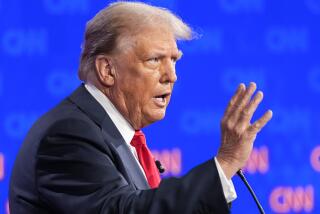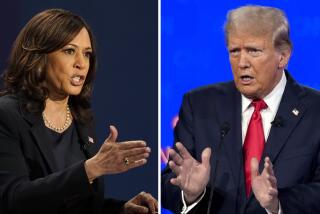Fog of politics on Benghazi
Some Republicans aren’t giving up on the claim Mitt Romney floated in the second presidential debate: that the Obama administration, for political reasons, downplayed the possibility that the deadly attack on a U.S. facility in Libya in September was a well-planned terrorist operation.
Sen. John McCain (R-Ariz.) has suggested that Susan Rice, the U.S. representative to the United Nations, is “not qualified” to serve as secretary of State because, in television interviews five days after the attack, she said that “the best assessment we have today” is that the attack in Benghazi began as a spontaneous response to earlier protests at the U.S. Embassy in Cairo related to the video “Innocence of Muslims.”
If the fog of war obscured what actually happened at Benghazi on Sept. 11 — even now, investigators are trying to reconstruct the events that led to the deaths of Ambassador J. Christopher Stevens and three other Americans — then the fog of politics continues to distort the picture of how and why the administration characterized the events the way it did. Most of the obfuscation has come from Republicans.
It’s now clear that Rice’s comments in several TV interviews on Sept. 16 faithfully tracked “talking points” that were assembled by intelligence officials and only slightly edited by the White House and State Department. (A reference to the Benghazi site changed from “consulate” to “diplomatic facility,” hardly evidence of a political cover-up.) The talking points said that there were indications that “extremists participated in the violent demonstration,” which “evolved into a direct assault.” But they didn’t indicate that officials had begun to suspect that groups affiliated with or modeled on Al Qaeda were involved.
Should the talking points have included that information? Perhaps, but in her appearance on “Face the Nation,” Rice did say that “it’s clear that there were extremist elements that joined in and escalated the violence. Whether they were Al Qaeda affiliates, whether they were Libyan-based extremists or Al Qaeda itself, I think is one of the things we’ll have to determine.”
Both Rice’s comments and the talking points on which they were based apparently erred in portraying the attack in Benghazi as a spontaneous reaction to the protests in Cairo. But the charge that she knowingly misled her interviewers or the country is, as President Obama rightly said at his news conference last week, outrageous and utterly unsupported by any evidence.
On Sunday’s “Face the Nation,” McCain suggested that Rice might return to his good graces “by publicly coming back on this show and saying, ‘I was wrong, I gave the wrong information on your show some several weeks ago.’ That might be a beginning.” No, the beginning would be for the senator to apologize to the ambassador.
More to Read
A cure for the common opinion
Get thought-provoking perspectives with our weekly newsletter.
You may occasionally receive promotional content from the Los Angeles Times.










